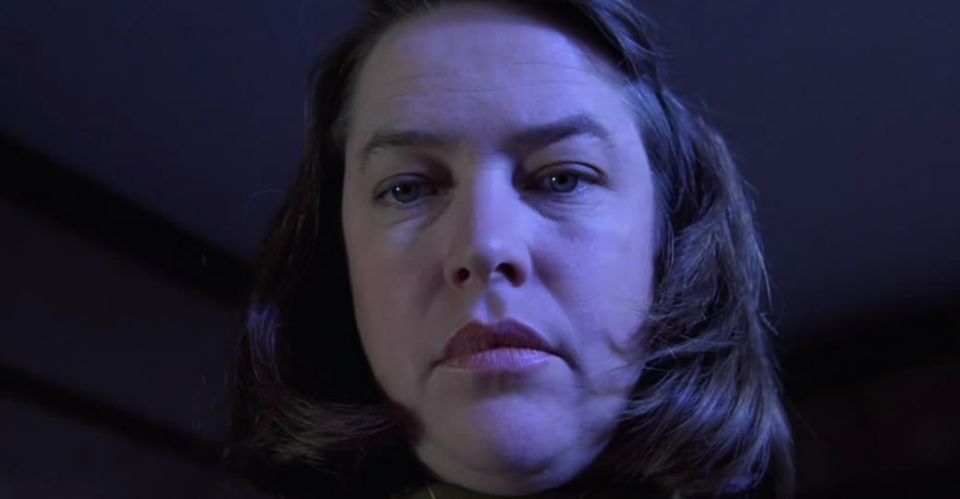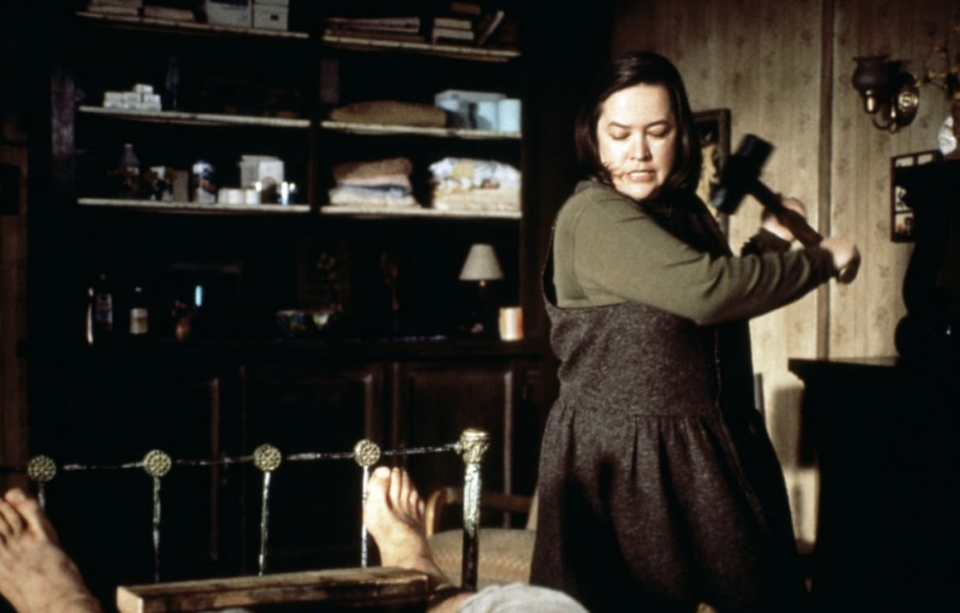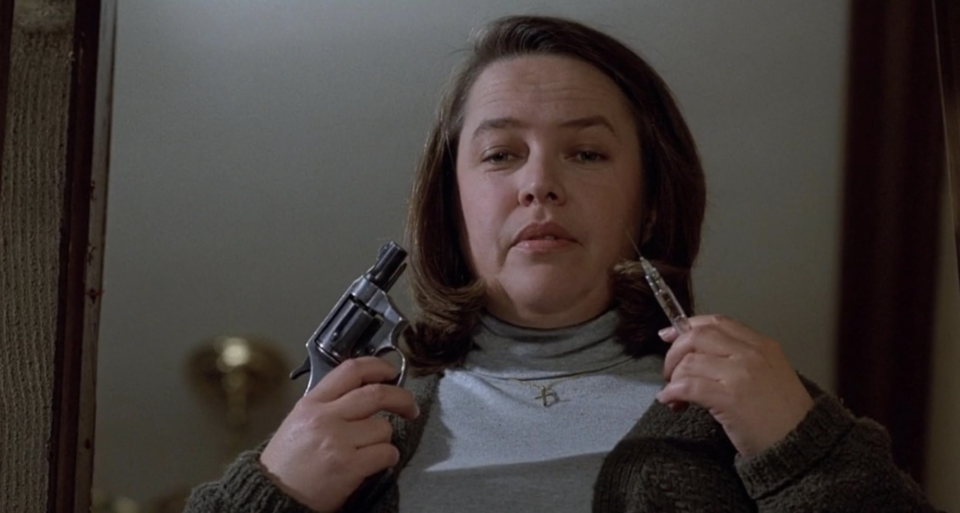Stephen King’s Annie Wilkes is Every Creator’s Worst Nightmare [Fatal Femmes]

Few words carry such loaded intensity for content creators as “I’m your number one fan.” Ever since the publication of Stephen King’s brilliant novel Misery, this statement has morphed from a declaration of support to an indicator of dangerous obsession. King’s 1987 novel follows Paul Sheldon, a writer held captive by his self-proclaimed “number one fan” Annie Wilkes. To survive he must not only navigate her dangerously erratic moods, but cater to her creative demands when his newest novel kills off her favorite character.
In his 1990 film adaptation, director Rob Reiner excises the novel’s commentary on addiction and substance abuse but gifts the world with a virtuoso performance from breakout star Kathy Bates. As the dangerously unhinged nurse Bates soars through Annie’s unpredictable moods unsettling the audience by provoking terror, outrage, and brief glimpses of sympathy. With her relatable excitement for Paul’s work combined with a deadly need to control, Annie Wilkes remains one of the most terrifying cinematic villains of all time.
Her Victim
Paul Sheldon (James Caan) is a novelist famous for a series of bodice-rippers named after the main character Misery Chastain. Though this work has brought him a great deal of fame and fortune, Paul—not unlike King himself—longs to be taken seriously by the literary world. To forge a new path, he’s concluded his forthcoming novel, Misery’s Child, with the death of his signature damsel in distress and begun work on a serious novel set in a gritty world filled with “slum kids.” To finish the book, Paul takes a room at his favorite mountain lodge and celebrates reaching the final page with a single cigarette and a bottle of champagne. Unfortunately, he’s failed to check the weather report and drives down the mountain into the path of an oncoming blizzard.
As the snow deepens, his car slides off the road and comes to a crumpled rest at the bottom of a steep cliff. Fortunately, an unseen savior pulls him from the car and carries him to safety. Paul awakens in the guest room of Annie Wilkes (Bates), a nurse who just so happens to be obsessed with his novels. As Annie’s true intentions become clear, she will test Paul’s will to live, his ability to create, and his understanding of the word misery.
Her Story

At first, Annie Wilkes seems too good to be true. She’s not only risked her own life to save Paul, but she’s got the medical skills and supplies to dress his injuries until he can get to a hospital. Unfortunately, Annie has no plans of letting him go. Operating on instinct, she lies and dodges his logistical questions until finally revealing the truth: she’s told no one where he is and plans to keep him in her guest room indefinitely.
King tells us right away that Annie is “dangerously crazy,” but Reiner takes his time with this revelation. It’s not until she snaps at Paul over profanity in his new book that we glimpse the unstable woman hiding beneath the charming and folksy facade. When Paul contradicts her, she loses her temper and screams colorful obscenities while splashing soup all over the bed. Annie quickly apologizes, but Paul can read the writing on the wall. He’s trapped with this volatile woman and his survival depends on managing her moods.
Annie is equally careless after finishing his new book. Insisting he burns the manuscript and goes back to writing Misery novels, Annie covers the draft with lighter fluid and hands him a match. While proclaiming her righteousness and the wisdom of this decision, Annie gesticulates and sloshes the flammable liquid all over Paul and the bed. Whether intentional or not, the message is clear: if Paul does not abide by her rules, he will pay a steep and painful price.
Gradually growing stronger and more resourceful, Paul finds ways to sneak out of his room during the rare stretches of time that Annie leaves the farm. Outside the tiny guest room, he learns that he is living with a murderer. Annie keeps a macabre scrapbook filled with clippings of her crimes including the mysterious death of her husband and the details of a casual reference to her time “on the stand.” Nicknamed the Dragon Lady, Annie was accused but ultimately acquitted of a series of infant murders committed while working as a maternity ward nurse. King’s novel gives us more information, pointing to a dangerous woman willing to kill anyone who challenges her or happens to fall into the gears of her madness.
Her Weapons

Reiner’s film may be associated with a sledgehammer (more on that in a minute), but Annie uses a variety of weapons, most of them objects she would legitimately own as a single woman and former nurse living on mountainous terrain. Knives, syringes, ropes, and shotguns all seem like perfectly reasonable tools she would use on a regular basis. Only the handgun she totes around in the pocket of her bathrobe seems out of place in the home of a former caregiver/pioneer woman.
However, Annie is a reactionary villain and excels at turning mundane objects into powerful weapons. When Paul dares to question her chosen typing paper, she slams a ream of it down on his injured legs. When she bursts into his room furious at Misery’s death, she threatens to smash a plant stand on his head. Anything that happens to be lying nearby becomes a deadly means of maintaining her dominance.
Of course, Reiner’s most famous scene does involve intention and planning. Having discovered that Paul has been out of his room, Annie uses a syringe to sedate her patient, ropes him to the bed, and braces his exposed feet with a block of wood. As Paul begs for mercy, she calmly explains the forthcoming “surgery,” blaming Paul for what she views as a necessary punishment. She then raises the sledgehammer and smashes it into one foot after another. This incredible scene is nearly impossible to watch partly due to the gruesome albeit bloodless effects devised by Greg Nicotero. We don’t even see the impact of the second blow. Paul’s screams of pain and the memory of that first broken ankle are enough to paint a vivid picture of what’s just happened.
King’s novel sees Annie cut one of Paul’s feet off with an ax, but Reiner’s small change amplifies the film’s themes of manipulation and abuse. Though the sledgehammer pulverizes the bones of Paul’s feet, its blunt surface does not break the skin. All of the damage, save for bruising, is contained on the inside and thus easier to dismiss. Like Annie, the outside looks mostly OK, if a little off-kilter. Only she and Paul know the true depths of misery lurking just below the surface.
Despite these powerful tools, Annie’s most effective weapon is her ability to manipulate. When Buster (Richard Farnsworth), the local sheriff, shows up at her door looking for Paul she disarms him with warm conversation and the offer of hot cocoa. However, the second his back is turned she drops the self-deprecating grin. Her face betrays the conniving calculation of a predator maneuvering around her prey. Bates’s excellent performance shows the breadth of these changes as well. When a period of heavy rain moves through the area, her flat demeanor stands in sharp contrast to the effervescent woman who swoons over Paul’s new chapters and plays Liberace music throughout the house. We never know what version of Annie will walk through the door, but each mood reveals a dangerously unstable woman with a rapidly diminishing connection to reality.
Her Motive

As a former nurse, Annie Wilkes enjoys the power she wields over her patients. Known as a pink-collar job, this is a field dominated by women and one of the few areas of society in which female professionals routinely override the will of the general population. Annie has clearly adopted the mindset that she knows what’s best for her patients and extends that to anyone she encounters. She’s used to causing pain for what she believes is the greater good and dismisses any challenges to her authority as weakness and fear. Annie also seems to derive pleasure from causing pain in others. As Paul screams in agony over his smashed feet, she moans a guttural “God I love you.” She’s so overcome with the misery she’s caused that she can’t even be bothered to hide the sexual thrill she’s getting from this domination.
Annie clearly suffers from an undiagnosed mental illness. It would be irresponsible to diagnose a fictional character from afar, but her days are clouded by delusion, depression, and the need to be seen as an all-powerful savior. We don’t know much about her time as a nurse but given her suicidal ideation, it’s reasonable to assume she murdered the newborns in her care as a misguided way to save them from what she believes to be a cruel world. Or perhaps she just wanted to cause their parents pain. What some would call an Angel of Death, Annie enjoys holding destructive and devastating power over anyone who would dare to challenge her view of the world.
Annie justifies her actions by framing Paul’s accident as a sign from God. She believes that she has not only been sent to save his life, but to redirect his turn towards more serious writing and give the world more Misery novels. She’s able to spin every event to fit her master plan. When she doesn’t like his new book, she tells herself she’s been sent by God to destroy it.
When Buster discovers Paul in the cellar, she kills him and tells herself God sent him to expedite her plans for a murder/suicide. Even her cover story contains shades of this delusion. To justify the typewriter and paper she bought for Paul, she tells Buster that she believes she’s been sent by God to carry on writing Misery novels after his passing. Paul manages to save himself by feeding this fantasy. He gravely tells her that their deaths will give Misery back to the world while secretly plotting a dramatic escape.
Regardless of what Annie tells herself, her path likely crossed Paul’s by a more practical route. As his “number one fan,” Annie has spent years following Paul’s career and dissecting the minute details of his life. She’s able to rattle off Paul Sheldon facts at the drop of a hat and knows well his superstitions when finishing a new novel. She likely moved to this particular farm due to its proximity to Paul’s favorite lodge. She admits to sitting in the parking lot and staring up at his window while he’s in residence and it’s likely that, like a true stalker, she’s placed herself in the vicinity of his orbit and waited for the perfect moment to pounce.
Her Legacy

With the threat of death looming, Paul orchestrates a showdown that will hit Annie where she’s most vulnerable. When her back is turned, he covers the final pages of the Misery novel she forced him to write with lighter fluid and drops a match on the pile. Though clearly a trap, Annie is unable to stop herself from diving into the fiery heap, hoping to salvage as much of the story as she can. This leads to an intimate and bloody fight to the death, but the moment in which Annie sees what Paul is planning is arguably Reiner’s most terrifying.
After nearly two hours of sadistic torture, we’ve adopted Paul’s fear of Annie’s outbursts and hypersensitivity to her moods. By now we know that a happy Annie means a safe Paul and the moment when he challenges her by refusing to share the novel’s ending becomes a death-defying challenge. A classic example of systemic abuse, we fear the repercussions Paul will face for daring to step out of line nearly as much as the certain death he will face if he does nothing.
There’s also a part of us who understands the desire to know the rest of the story. We’ve all fallen in love with a particular character and anxiously awaited the next chapter. Perhaps they distract us from a challenging time in our own lives or excel at behaviors we hope to attain. We begin to see them as real elements of our own lives and actions that don’t align with our understanding of the beloved character can feel like a betrayal. Perhaps Annie feels so threatening because we recognize a bit of ourselves in her all-consuming devotion to Misery.
But within this relatability lies Annie’s most powerful legacy. A cautionary tale about rationality and perspective, Annie uses her genuine fandom to disguise controlling abuse. She may love Misery Chastain, but this does not entitle her to ownership over Paul’s creative decisions. In a world where hashtag campaigns and cyberbullying can influence the decisions of major studios, the line between creator and consumer has never felt so blurry. As the audience, we can inspire and we can ask, but we can’t demand. We can shout from the rooftops that our version of a character would never act in such a way, but we can’t force the author to rewrite the narrative to suit our greedy demands.
When we try to impose our will over the creative vision of others—when we insist that we know what is best—we are no better than Annie Wilkes. We’ve ceased to be fans and become abusers.
Categorized:Editorials

